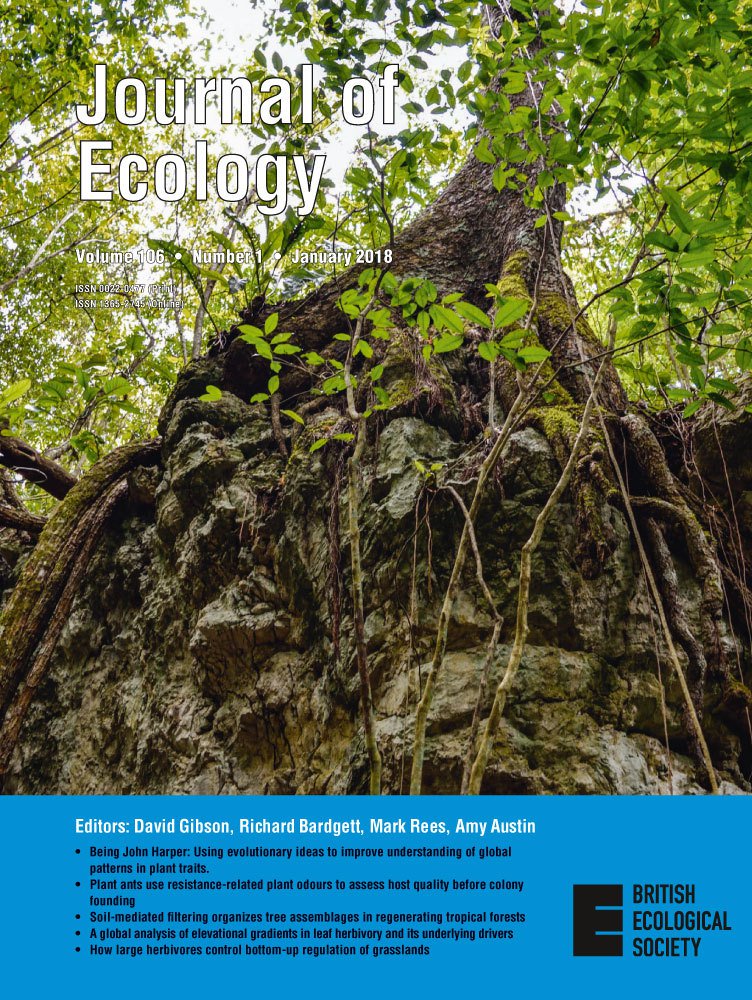View Item
- xmlui.general.dspace_homeCentros Regionales y EEAsCentro Regional Patagonia SurEEA Santa CruzArtículos científicosxmlui.ArtifactBrowser.ItemViewer.trail
- DSpace Home
- Centros Regionales y EEAs
- Centro Regional Patagonia Sur
- EEA Santa Cruz
- Artículos científicos
- View Item
Herbivores safeguard plant diversity by reducing variability in dominance
Abstract
Reductions in community evenness can lead to local extinctions as dominant species exclude subordinate species; however, herbivores can prevent competitive exclusion by consuming otherwise dominant plant species, thus increasing evenness. While these predictions logically result from chronic, gradual reductions in evenness, rapid, temporary pulses of dominance may also reduce species richness. Short pulses of dominance can occur as biotic or abiotic
[ver mas...]
Reductions in community evenness can lead to local extinctions as dominant species exclude subordinate species; however, herbivores can prevent competitive exclusion by consuming otherwise dominant plant species, thus increasing evenness. While these predictions logically result from chronic, gradual reductions in evenness, rapid, temporary pulses of dominance may also reduce species richness. Short pulses of dominance can occur as biotic or abiotic conditions temporarily favour one or a few species, manifested as increased temporal variability (the inverse of temporal stability) in community evenness. Here, we tested whether consumers help maintain plant diversity by reducing the temporal variability in community evenness.
We tested our hypothesis by reducing herbivore abundance in a detailed study of a developing, tallgrass prairie restoration. To assess the broader implications of the importance of herbivory on community evenness as well as potential mechanisms, we paired this study with a global herbivore reduction experiment.
We found that herbivores maintained plant richness in a tallgrass prairie restoration by limiting temporary pulses in dominance by a single species. Dominance by an annual species in a single year was negatively associated with species richness, suggesting that short pulses of dominance may be sufficient to exclude subordinate species.
The generality of this site‐level relationship was supported by the global experiment in which inter‐annual variability in evenness declined in the presence of vertebrate herbivores over timeframes ranging in length from 2 to 5 years, preventing declines in species richness. Furthermore, inter‐annual variability of community evenness was also negatively associated with pre‐treatment species richness.
Synthesis. A loss or reduction of herbivores can destabilize plant communities by allowing brief periods of dominance by one or a few species, potentially triggering a feedback cycle of dominance and extinction. Such cycles may not occur immediately following the loss of herbivores, being delayed until conditions allow temporary periods of dominance by a subset of plant species.
[Cerrar]

Author
Mortensen, Brent;
Danielson, Brent;
Harpole, William Stanley;
Alberti, Juan;
Arnillas, Carlos Alberto;
Biederman, Lori;
Borer, Elizabeth T.;
Cadotte, Marc William;
Dwyer, John Matthew;
Hagenah, Nicole;
Hautier, Yann;
Peri, Pablo Luis;
Seabloom, Eric William;
Fuente
Journal of ecology 106 (1) : 101-112. (January 2018)
Date
2018-01
ISSN
1365-2745
Formato
pdf
Tipo de documento
artículo
Palabras Claves
Derechos de acceso
Restringido
 Excepto donde se diga explicitamente, este item se publica bajo la siguiente descripción: Creative Commons Attribution-NonCommercial-ShareAlike 2.5 Unported (CC BY-NC-SA 2.5)
Excepto donde se diga explicitamente, este item se publica bajo la siguiente descripción: Creative Commons Attribution-NonCommercial-ShareAlike 2.5 Unported (CC BY-NC-SA 2.5)

